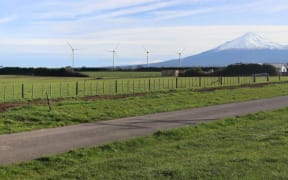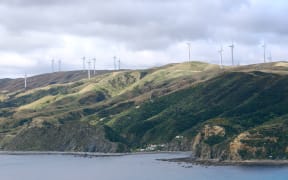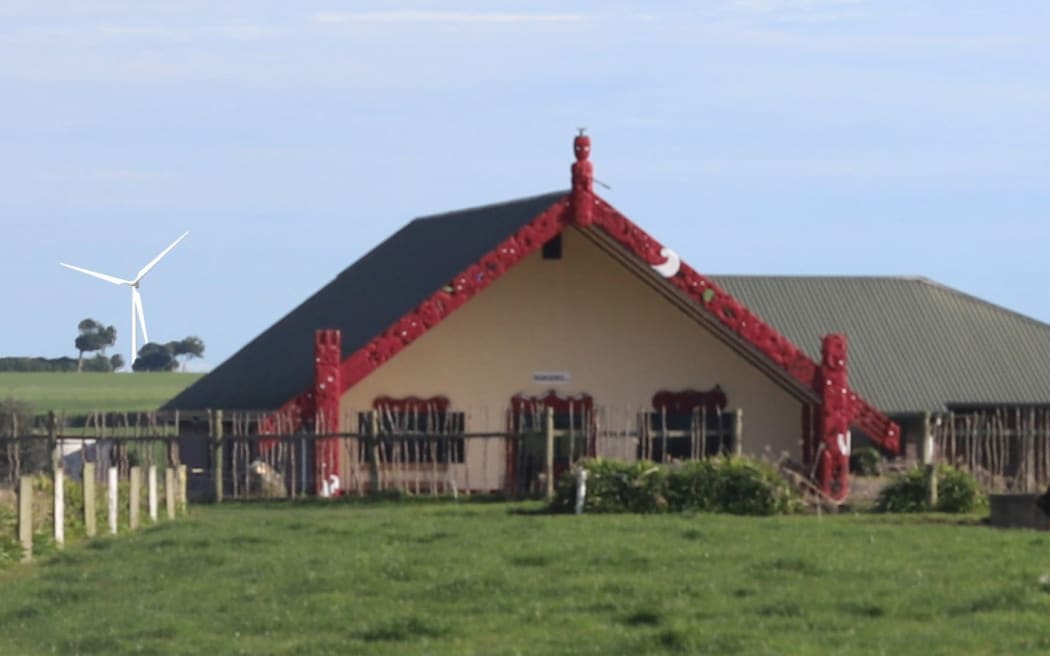
Hiringa Energy's simulated view of a wind turbine tower from Aotearoa Pā. Photo: Supplied / Hiringa Energy
Hapū of Ngāruahine iwi are going to the United Nations to challenge fast-track resource consenting as undemocratic after failing to stop New Zealand's tallest wind power turbines being built in South Taranaki.
The hapū are filing three claims under separate UN mechanisms because the usual right of appeal to the Supreme Court is not available under the Covid-19 fast-track law, by which the windmills got consent.

Hapū representatives say laws with slashed input from residents risk becoming the norm as resource management is overhauled by the coalition government.
The UN challenge comes with Māori poised to converge on Tūrangawaewae this weekend to answer Kīngi Tūheitia's call for a united, independent response to the new government's blitz on established iwi and hapū rights.
Four turbine towers - at 206 metres, second only to Auckland's Sky Tower in the country's highest building stakes - are to be built by Hiringa Energy and Ballance Agri-Nutrients at Kāpuni to power a hydrogen-making plant.
Just before Christmas the Court of Appeal rejected an attempt to stop the windmills coordinated by the post-settlement iwi entity Te Korowai o Ngāruahine and Greenpeace.
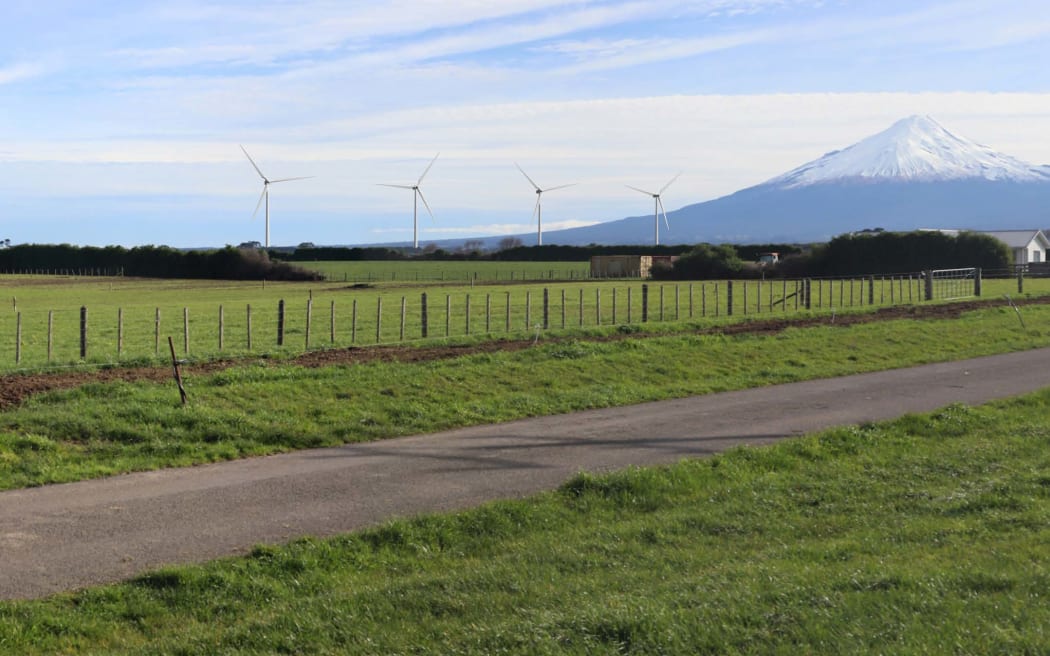
Hiringa Energy's simulated view of the wind turbine towers from Te Aroha Marae. Photo: Supplied / Hiringa Energy
Hiringa Energy chairperson Cathy Clennett said the court decision was a tremendous relief and that the company "looks forward to continuing to work together with local iwi, hapū, and the community to deliver the regional benefits of a low-emissions future".
But Ngāruahine maintain that the giant windmills will be dominant in a highly valued cultural landscape, blocking views of Taranaki Maunga and impacting on hapū relationships with what the Crown recently recognised as an ancestral mountain.
Ōkahu-Inuāwai hapū led the appeal court case alongside Greenpeace and hapū chair John Hooker wants the government to "urgently take swift steps to reject these undemocratic fast track reforms".
Hooker said the now-repealed Covid-19 Recovery (Fast-track Consenting) Act was meant to support recovery from the pandemic but normalising its mechanisms was a dire threat to all New Zealanders.
Constitutional and Te Tiriti breaches embedded in the fast-track process were "abhorrent" and "hapū multi-track international law filings" were a bid to guarantee democratic rights of meaningful participation for all in public decision-making, he said.
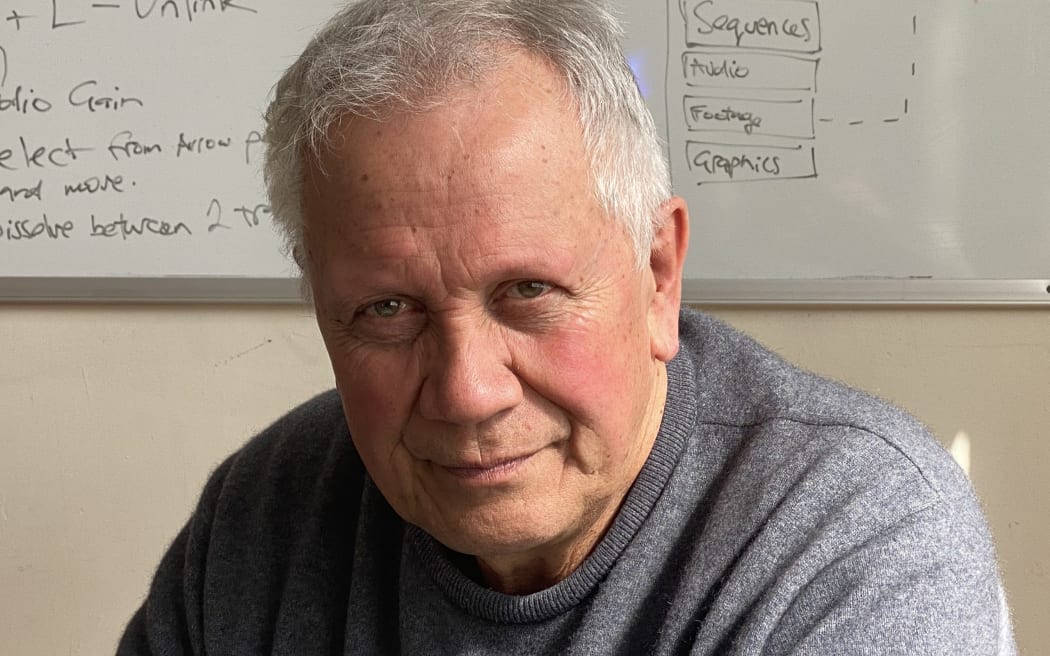
John Hooker says Ngāruahine are standing up for everyone's right to have a say in decisions about resource development. Photo: Supplied / Te Korimako o Taranaki
A hapū environment committee representative, Mere Brooks, said the exclusion of proper tikanga-led consultation was a "blatant continued imposition of colonialism which will not be accepted".
In a hapū statement, they said they were filing under the investigative mechanism of the UN's Human Rights Council due to denial of the right to advance to the Supreme Court.
A request had also been made to UN Special Rapporteurs for a formal complaint to be lodged against the government, which would trigger a 60-day countdown it to "defend their position or amend to uphold democratic rights at the heart of this case".
A third filing was a complaint under the UN Human Rights Committee for breach of the right to culture under Article 27 of the Universal Declaration of Human Rights.
That complaint was "informed by" the UN Declaration on the Rights of Indigenous People which New Zealand signed up to under Sir John Key's previous National-led government.
Included at the Court of Appeal were the hapū Ōkahu-Inuāwai me ētehi atu, Ngāti Tū, Ngāti Tamāhuroatitahi, Ngāti Haua and Kanihi Umutahi me ētehi atu.
The judges found that consent for the windmills had been consistent with the principles of the Treaty as applied in the Covid fast-track law and "the project reflected a balancing of interests reflective of the partnership that the Treaty represents".
The original consenting panel stipulated that future replacement turbines must be built on the coastal side of State Highway 45, far from the mountain, on a site chosen in collaboration with hapū.
The hapū and Greenpeace also appealed against consent conditions they said did nothing to stop Hiringa Energy using the hydrogen to make nitrogen fertiliser for decades, and said the court needed to rule that out.
The appellants say they oppose current levels of synthetic urea fertiliser use because of nitrogen pollution in rivers and drinking water.
The appeal court rejected their call for a mandatory timetabled move away from fertiliser production and towards use as a transport fuel, saying the uptake of hydrogen by trucking companies was outside Hiringa Energy's control.
Hiringa's Clennett said the giant windmills will power an electrolyser to produce industrial scale green hydrogen as feedstock to reduce the Ballance plant's environmental footprint, and as a zero-emission transport fuel.
Ballance's chief executive Kelvin Wickham said they would begin producing hydrogen as soon as possible.
Greenpeace Aotearoa programme director Niamh O'Flynn said Hiringa should "commit to a transition out of fertiliser production within five years as well as honouring the wishes of local hapū with regards to the location of the wind turbines".
LDR is local body journalism co-funded by RNZ and NZ On Air

